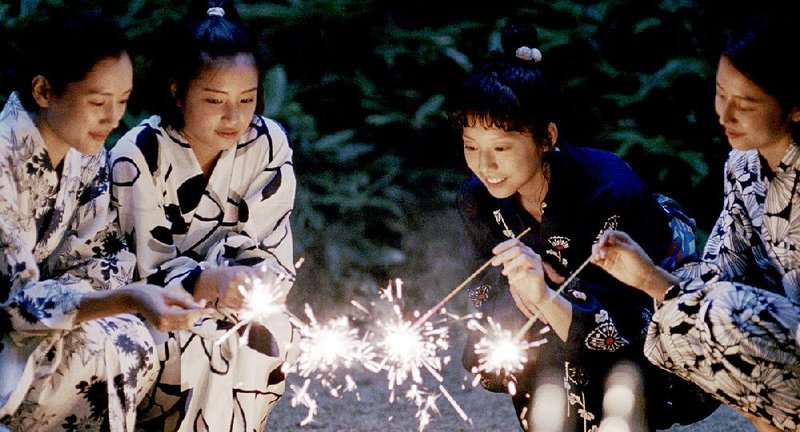There is a cinema of the everyday, comprising filmmakers uninterested in special effects or blockbuster gestures. Think about the feminist director Chantal Akerman's deep and varied oeuvre, in which the strongest emotion evoked is often a protagonist's discomfort. In her fiction and nonfiction, Akerman -- a Jew from Belgium -- uses minimal "plots" as a way of exploring the loveliness (and horror) of ordinary moments in ordinary lives.
I'm aware that many people reading this review may never have heard of Akerman (who killed herself about a year ago); in a couple of senses, her films are hard to see. As a rule they don't show up in multiplexes and if they did it's likely that most of the audience would be befuddled by a movie where "nothing happens." They must be sought out.
Our Little Sister
90 Cast: Haruka Ayase, Masami Nagasawa, Kaho, Suzu Hirose, Shin’ichi Tsutsumi
Director: Hirokazu Koreeda
Rating: PG, for thematic elements and brief language
Running time: 128 minutes
Watching Hirokazu Koreeda's Our Little Sister, I thought more than once about Akerman, and about how fortunate we are the movie has received a theatrical release in this country. For it's also a movie where "nothing happens," at least not in the sense that things usually happen in the movies. There is no great trauma, act of betrayal or lurid twist at the core of this sweet and patient family melodrama. But that's not to suggest it isn't worth watching, unless you believe the discovery of common beauty banal.
As the film begins, three 20-something sisters are living in a rambling family house in the seaside town of Kamakura, Japan. They have inherited the house from their grandmother and they've just learned that their father -- who abandoned his family for a younger woman many years ago -- has just died. (Their mother died soon after their father left.) From the domestic banter we pick up on the family dynamic: Sachi (Haruka Ayase), the eldest sister, took on the job of raising her younger sisters, Chika (Kaho) and Yoshino (Masami Nagasawa) and still retains household primacy.
At their father's funeral, they encounter, for the first time, Suzu (Suzu Hirose), their 14-year-old half-sister. She was the daughter of their father and his deceased second wife; she's now living, somewhat awkwardly, with their father's widow (his third wife). Sachi senses Suzu's discomfort and decides to offer to take her in.
All of this happens within the first 15 minutes of the film, and there's little else that happens that might be described as eventful. Suzu comes to live with her half-sisters and they all more or less get along. Koreeda focuses on the quiet, melancholic moments like Suzu's departure, rendering them in unsentimental but affecting simplicity.
American audiences are likely to find this sort of low intensity drama curious (scenes revolve around the girls, who are unfailingly polite to one another even when expressing disagreement). Crucial scenes are built around the small revelations such as the news that a favorite restaurant may be closing; Suzu enjoys a stunningly shot bike ride with a male friend who isn't destined to be her boyfriend. Sometimes bad news is delivered directly and Koreeda hurries on to the next scene, indicating that sadness is just another part of these characters' lives. Like life, the movie doesn't stop to let the lessons sink in.
It might be helpful to know that Koreeda's screenplay is adapted from a popular manga series aimed at a female audience, Akimi Yoshida's Umimachi Diary. This is a world where women aren't defined by their relationships with men, though Sachi is worried that her clandestine affair with a married doctor might mean she has inherited some of her father's feckless disregard for decency.
It is entirely possible to simply enjoy the film for Koreeda's wry and clever camera, the way he subverts certain visual cliches (like a night sky splattered with fireworks). There's an elliptical quality in his visual storytelling that matches the way the script seems to skirt unpleasantness, as the characters carry on with brave good humor.
There was an American TV show in the '70s with a line in it about how a "group" must "somehow form a family." This is perhaps a hyper-realistic version of that story, without the overt jokes and video-sharp outlines. Our Little Sister is a lyrical, plain-sung movie about people who are obliged to love one another. And do.
MovieStyle on 09/02/2016
